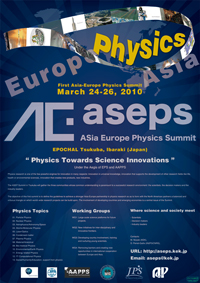 |
 |
|||||||||||||
|
|||||||||||||
|
|||||||||||||
|
Even though the international collaboration in physics research has a long history, Europe-Asia cooperation remains quite weak, compared to the collaboration between Europe and Americas or Asia and Americas. To strengthen the cooperation in physics research between European and Asian countries, the first Asia-Europe Physics Summit, or ASEPS, will be held 24 to 26 March in Tsukuba, Japan. “This summit aims at strengthening the cooperation in physics research between European and Asian countries,” said Mitsuaki Nozaki from KEK, former Asian regional director of the Global Design Effort, and co-chair of the summit with Denis Perret-Gallix from CNRS, France. “A balanced cooperation between Europe, Asia, and the Americas is crucial for large scale physics research projects to succeed. We hope that this summit will reinforce the Asia-Europe cooperation as a first step towards a true equilibrium between the three main regions.” The ASEPS will address projects in fundamental physics or physics research that play a significant role in other fields such as life science and health, environmental and energy studies. One of the main goals for the summit is to discuss the common scientific interests of European and Asian countries in these various research fields. “It will be a unique forum to politically address the future of research,” said Denis Perret-Gallix. “Physics research is the perfect field for initiating the building of a global scientific research governance, because physics is covering a wide scope of research activities. In addition, the physics community has a long experience in international collaboration. We have to identify the obstacles hampering Europe-Asia cooperation and to develop and share a common vision for the future,” said Perret-Gallix. One outcome of the summit could be the setting up of a dedicated framework that would help boost the level of the Euro-Asia collaborations in physics for the next 15 to 20 years. In this framework, high-level meetings could initiate more ambitious projects like common large-scale infrastructures, such as the ILC. Another would be to get the developing countries more involved in basic research in the hope to bridge the knowledge or digital gap. The summit is supported by CNRS (Centre National de la Recherche Scientifique) in France and by JSPS (Japan Society for the Promotion of Science) in Japan. Preparations are underway by KEK as the administrative organisation. The EPS (European Physical Society) and the AAPPS (Association of Asia Pacific Physical Societies) are participating, and both presidents are jointly calling for physicists to attend the summit. Early registration for ASEPS will be open until 28 February. Check the ASEPS website for more information. -- Rika Takahashi |
|||||||||||||
| © International Linear Collider |
